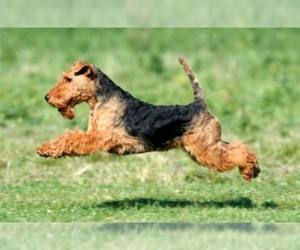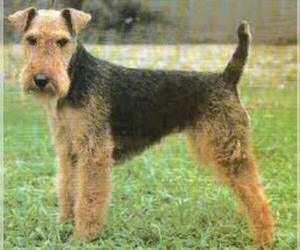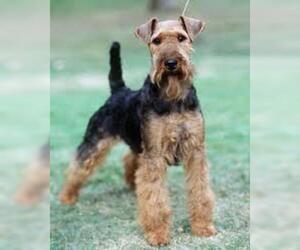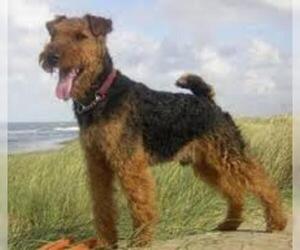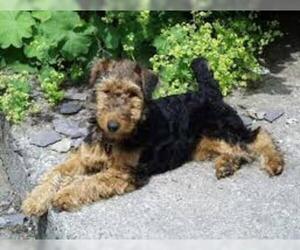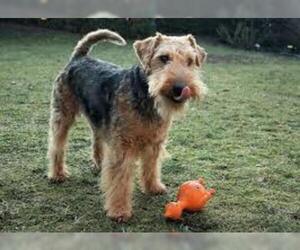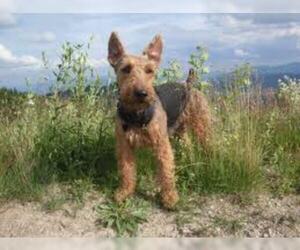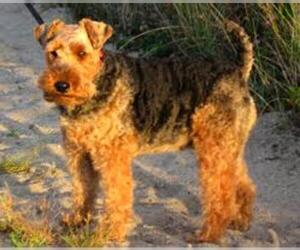All about Welsh Terrier dog breed
A.K.A. :WT, Cymric Terrier
Size
Grooming requirements
Exercise requirements
Good with other dogs
Watchdog ability
Energetic
Training requirements
Playful
Affectionate
Good with other pets
Good with children
Good with strangers
Winter
Summer
Healthiness
Protective
Life Span
| Pure Breeds | Member |
| Breeds A - Z | W |
| Breeds by Group | Terrier |
| Breeds by Trait | Hypoallergenic Low Shedding |
| Overview: | The Welsh Terrier is a charming and spirited breed, originating from Wales where it was primarily used for hunting badgers, foxes, and otters. Physically, they are a medium-sized terrier, typically weighing 18-22 pounds, with a distinctive wiry, dense coat that is predominantly black and tan. Their square, compact build and alert expression reflect their historical role as agile hunters. Temperamentally, Welsh Terriers are known for being intelligent, outgoing, and affectionate with their families, though their terrier instincts mean they can also be determined and, at times, mischievous. They generally do well with children and other pets if properly socialized, making them a good fit for active families. While adaptable to apartment living, they require regular exercise and mental stimulation to prevent boredom and destructive behaviors. Overall, they are a healthy breed, but potential owners should be aware of a predisposition to certain conditions like glaucoma and epilepsy. Their loyal and playful nature makes them a delightful companion for those who appreciate their independent spirit. |
F.A.Q.
All You Need to Know About the Welsh Terrier Breed
The Welsh Terrier is a charming, intelligent, and energetic breed originating from Wales, where they were used for hunting badgers, foxes, and otters. Known for their courageous yet amiable nature, they make excellent companions for active individuals or families. Physically, they boast a wiry, dense black and tan coat, requiring regular brushing and occasional stripping to maintain its iconic appearance. Their compact, sturdy build, weighing around 20 pounds, makes them adaptable to both houses with yards and, with sufficient exercise, apartment living. They are generally good with children and other pets if properly socialized from a young age. While not excessive barkers, they possess a typical terrier keenness and alertness. Daily exercise is crucial to satisfy their moderate energy levels, preventing boredom and potential mischief. Grooming needs are moderate, with professional stripping every 8-12 weeks often recommended. Health-wise, they are a robust breed with a lifespan of 12-15 years, although some may be prone to certain genetic conditions like glaucoma or allergies. Overall, the Welsh Terrier is a devoted, spirited, and relatively low-shedding dog, offering a delightful blend of playful antics and loyal companionship for those prepared for their terrier zest.The average weight of a Welsh Terrier is around 20 pounds.
Healthy weight for Welsh Terrier adults typically ranges from 18 to 22 pounds. There is generally no significant weight difference between male and female Welsh Terriers; both sexes fall within this same range for a healthy, athletic build. This average size ensures they remain agile and sturdy, characteristic of the breed.Curious about the Welsh Terrier height and how tall these charming dogs typically get? We've got the details you need!
The average height of a Welsh Terrier is approximately 15 inches at the shoulder. This measurement refers to the distance from the ground to the top of their shoulder blades.When considering the typical adult Welsh Terrier size, you can expect a range of about 14 to 15.5 inches. While there isn't a significant height difference based on gender in Welsh Terriers, males might occasionally be at the higher end of this range, and females at the lower. However, individual genetics play a larger role in determining an exact height within this spectrum. Responsible breeders strive to produce dogs within the breed standard, which helps ensure consistent and predictable sizing.So, if you're wondering, "How tall is a Welsh Terrier?" remember they are a medium-sized terrier, standing proudly around 15 inches tall, making them a very manageable and adaptable companion for many lifestyles!Welsh Terrier colors are quite distinct, with the breed primarily recognized for its classic Black & Tan coat. This is the AKC recognized Welsh Terrier color and the most common. The body is black, often a deep, rich shade, with tan markings on the legs, underparts, and head. There are no rare coat types or exotic Welsh Terrier variations officially recognized by major kennel clubs like the AKC for this breed. While some may inquire about variations like "blue," "lilac," "merle," or "chocolate" in other breeds, these are not naturally occurring or accepted Welsh Terrier colors. Fawn, cream, or white are also not typical or accepted colors for the Welsh Terrier. Focus on the standard Black & Tan for an authentic and recognized Welsh Terrier.
The Welsh Terrier personality is a delightful blend of vivacity and affection. Known for their spirited and confident temperament of Welsh Terrier, they are generally very friendly and outgoing, often greeting strangers with enthusiastic curiosity. Loyalty is a hallmark of the breed; they bond deeply with their families, becoming devoted companions.Welsh Terriers are moderately sociable, enjoying interaction but also capable of independent play. They are surprisingly adaptable to apartment living as long as their exercise needs are met with daily walks and playtime. Their moderate size and relatively calm indoor demeanor make them suitable for urban environments.With children, Welsh Terriers are typically good-natured and playful, particularly when raised with them. However, like all terriers, they have a feisty side and are best suited to homes with older, respectful children who understand how to interact with dogs. Regarding other pets, their strong prey drive means they may not be suitable for homes with small, non-canine pets unless introduced and socialized very carefully from a young age. They can often coexist happily with other dogs, especially when properly introduced.
Welsh Terrier Temperament & PersonalityThe Welsh Terrier boasts a bold, spirited, and affectionate temperament, making them a captivating companion. They are generally friendly and outgoing, exhibiting a delightful zest for life. As highly sociable dogs, they thrive on interaction with their families and are incredibly loyal and devoted to their human companions.Their adaptable nature means they can be well-suited for apartment living provided they receive adequate daily exercise and mental stimulation. Welsh Terriers are known to be good with children, especially when raised with them, displaying a playful and tolerant demeanor. However, their strong terrier instincts mean they may require careful introductions and supervision with other pets, particularly smaller ones, due to their prey drive.While intelligent and eager to please, Welsh Terriers can exhibit a streak of stubbornness, a characteristic common to many terriers. Consistent training with positive reinforcement is key to managing this trait. They are not overly sensitive but respond best to fair and firm guidance rather than harsh correction. Expect a lively and engaging companion that will keep you entertained with their charming personality.
Welsh Terrier Care: Your Daily Maintenance GuideWelsh Terriers are relatively low-energy dog breed known for their delightful personalities. How to care for a Welsh Terrier involves regular attention to their moderate needs.Grooming Needs: Despite their wiry coats, Welsh Terriers are not brachycephalic and therefore do not have wrinkle cleaning needs. Their non-shedding coat requires professional hand-stripping every 2-3 months to maintain coat health and color. Daily brushing is not essential, but weekly brushing helps remove loose hair and prevent matting. Occasional baths are sufficient, using a dog-specific shampoo. Ear cleaning should be done weekly to prevent infections, as their drop ears can trap moisture.Exercise Limitations: Welsh Terriers are energetic and require daily exercise to stay happy and healthy. At least 30-60 minutes of vigorous activity, such as brisk walks, playtime in a secure yard, or engaging in dog sports like agility, is recommended. They are not suited to being left alone for long periods without adequate mental and physical stimulation.Dietary Considerations: Feed a high-quality commercial dog food appropriate for their age, weight, and activity level. Avoid overfeeding to prevent obesity, a common health concern. Monitor treat intake and consider measuring food portions to manage weight effectively. Consult your veterinarian for personalized dietary considerations.Climate Sensitivity: Welsh Terriers tolerate various climates well, but like all dogs, they should not be left in extreme heat or cold. They are not brachycephalic, so breathing difficulties due to heat are less common than in some other breeds, but heatstroke is still a risk in hot weather. Provide fresh water and shade in warm conditions.Common Health Concerns & Health Tips for Welsh Terrier: Regular veterinary check-ups are crucial for early detection and prevention of health issues. Skin issues can arise from allergies or improper grooming; consistent grooming and a healthy diet can help. Dental care is vital; daily brushing with dog-specific toothpaste and regular professional cleanings will prevent plaque buildup and gum disease. Weight management is key to preventing obesity-related problems like joint issues and diabetes. Watch for signs of luxating patella and eye conditions, which can occur in the breed. Welsh Terrier care focused on prevention and early intervention ensures a long, healthy life for your companion.
Welsh Terrier Activity Level: Welsh Terriers are a moderately active breed, known for their lively and energetic nature. They possess a surprising balance, capable of short bursts of intense activity and long periods of rest. Despite their smaller size, they are not a "lap dog" in terms of constant cuddling and inactivity; they thrive on engagement and mental stimulation.
Exercise Needs: How active are Welsh Terriers? They require daily exercise to maintain their physical and mental well-being. This typically translates to 30-60 minutes of dedicated activity per day. This can include brisk walks, off-leash play in a securely fenced yard, or interactive games. They love to explore and follow their noses, so walks should be stimulating. Early socialization and training are crucial to channel their natural terrier instincts positively.Playtime Preferences: Welsh Terriers enjoy interactive playtime, excelling in activities that engage their intelligence and natural instincts. They love to chase balls, play fetch, and participate in puzzle toys that challenge their minds. Their natural prey drive means they might enjoy activities like earthdog trials or agility. While they can enjoy a good cuddle session, they are generally not content to simply lounge all day.Limitations and Considerations: Unlike some brachycephalic breeds, Welsh Terriers are not brachycephalic (short-nosed). This means they generally do not suffer from the breathing difficulties often associated with flat-faced dogs, allowing them to participate in more vigorous exercise without as much concern for overheating. However, like all dogs, they should not be over-exercised in extreme heat or humidity. Their sturdy build and terrier tenacity mean they can handle a good amount of activity without significant physical limitations.Suitability for Households: Welsh Terriers are best suited for active families or individuals who can commit to their daily exercise and mental stimulation needs. They are adaptable and can thrive in various living situations, including apartments, as long as their exercise requirements are met. They are generally not a good fit for very low-energy households where they would not receive enough engagement, as boredom can lead to destructive behaviors. If you're looking for a companion that will join you on walks, hikes, and provide playful companionship, the Welsh Terrier's activity level makes them an excellent choice.Welsh Terriers are not brachycephalic, so brachycephalic dog care practices are unnecessary. However, their dense coat and active nature contribute to mild heat sensitivity, especially in warm climates or during vigorous activity. Providing shade, hydration, and regular grooming is essential. Spinal problems such as arthritis or degenerative disc disease may occur with age or poor conditioning, particularly in dogs with limited mobility or excess weight.
Understanding how to keep Welsh Terrier healthy involves regular veterinary checkups, early screening for joint, thyroid, and eye conditions, consistent grooming to manage coat and skin hygiene, weight control, and tailored exercise routines. With attentive care, Welsh Terriers can enjoy a spirited, affectionate life of 12–15 years.
Breed Breakdown: What Experts Say About the Welsh Terrier
I'd rate the "Size" trait of the Welsh Terrier breed a 4 out of 10.Welsh Terriers are a medium-sized terrier, consistently falling into the small to medium range when compared to the vast spectrum of dog breeds. They typically stand around 15-15.5 inches at the shoulder and weigh between 18-22 pounds. Their body structure is compact, sturdy, and well-muscled, without being delicate or excessively heavy-boned. While certainly not tiny like a Chihuahua, they are significantly smaller than a Labrador Retriever or even a Standard Poodle. They are generally larger than many toy breeds but smaller than most working or sporting breeds. This manageable size makes them an excellent fit for apartment living, especially with sufficient daily exercise. Their compact nature also makes them relatively easy to travel with, fitting comfortably in crates designed for medium-small dogs, and they are well-suited for households with moderate space constraints, as they don't require vast amounts of room to move around indoors.
I would rate the Welsh Terrier's "Grooming Requirements" as a 7.While they are not as demanding as some long-haired or heavily shedding breeds, they are far from low-maintenance. Their hallmark is their wiry, double coat, which does not shed much but absolutely requires regular attention to maintain its texture and prevent matting. This means professional hand-stripping typically every 6-8 weeks, or at the very least, consistent clipping, which softens the coat but is easier for owners. Without this specialized coat care, their distinctive appearance and coat health will suffer. Beyond the coat, their ears need regular checking and cleaning to prevent infections, and nail trimming is essential, as with all dogs, to maintain proper foot health. They don't have significant skin folds or a high susceptibility to skin issues if their coat is properly cared for, and bathing is only needed occasionally. Compared to many companion dogs, their need for specialized coat maintenance, particularly hand-stripping, makes them more demanding than breeds with wash-and-wear coats, pushing them towards the higher end of the spectrum.
I would rate the Welsh Terrier's "Exercise Requirements" at a 7.While not a hyperactive breed, the Welsh Terrier is a robust and intelligent working terrier that thrives on regular, structured activity. They possess a good amount of energy and stamina for their size, enjoying brisk walks, engaging playtime with their owners, and opportunities for mental stimulation through training or puzzle toys. They are well-suited for activities like agility or earthdog trials, showcasing their natural prey drive and athletic build. While they don't have the extreme demands of some high-drive working breeds, they are far from couch potatoes. A Welsh Terrier left with insufficient exercise can become bored, destructive, and even a bit mischievous, highlighting their need for routines that include both physical exertion and mental engagement to stay healthy and well-behaved. They do not have brachycephalic anatomy, so respiratory limitations are not a concern.
The Welsh Terrier rates a solid 8 out of 10 for "Watchdog Ability." This breed is far from a passive companion and certainly capable of providing meaningful early warnings. They possess an inherent alertness, with keen senses that make them quick to notice anything out of the ordinary. Their barking behavior is a key component of their watchdog prowess; they are not typically yappy, but their barks are purposeful and effective in announcing unfamiliar sounds or the presence of strangers. Strong territorial instincts mean they view their home and family as their domain to protect, and they are not shy about vocalizing their disapproval of perceived threats. While not an aggressive breed, their courage and determination, coupled with their strong bark, are often enough to deter intruders and certainly provide ample warning to their human companions.
I would rate the Welsh Terrier's "Good with Other Dogs" trait a 4 out of 10.Welsh Terriers are not naturally dog-friendly and often display typical terrier traits of independence and a strong prey drive. While they can be successfully integrated into multi-dog households, especially when raised with other dogs from a young age and with consistent socialization, they require careful introductions and ongoing management. They tend to be assertive and can be prone to dominance challenges, particularly with other dogs of the same sex or those who don't back down. Their high energy and sometimes pushy play style might not be appreciated by all dogs, and their inclination to chase can be problematic for smaller or more timid companions. They generally do not thrive in situations where they are expected to be universally sociable and can quickly become involved in altercations if boundaries are not clear or if another dog challenges them. Coexisting peacefully often requires the owner to be highly vigilant and proactive in managing interactions.
I would rate the Welsh Terrier's "Energetic" trait as an 8 out of 10.The Welsh Terrier is a naturally active and spirited breed, far from laid-back compared to many other companion dogs. They possess a high typical activity level, demonstrating excellent endurance during play and outdoor adventures. Their inherent terrier nature means they are incredibly playful and require a significant amount of physical stimulation to remain well-behaved and content. They excel in various outdoor and athletic activities, enjoying vigorous walks, runs, and games that challenge both their bodies and minds. While their brachycephalic anatomy isn't as pronounced as some other breeds (like Bulldogs or Pugs), it can still subtly affect stamina and exercise tolerance, particularly in hot weather or during extremely strenuous activities. Owners should be mindful of this and ensure they don't overexert their Welsh Terrier, always providing access to water and shade. However, their drive and eagerness to be active are undeniable, making them a fantastic choice for active individuals or families who can meet their substantial exercise needs.
I'd rate the Welsh Terrier's "Training Requirements" at a 7 out of 10.While intelligent, Welsh Terriers possess a strong independent streak and a formidable will, classic terrier traits that make training more challenging than with breeds eager to please. Their attention span can be short, especially when something more exciting (like a squirrel) crosses their path, and they are not inherently highly responsive to commands without significant effort. Consistency is absolutely paramount; any lapse in training will quickly be exploited. Positive reinforcement, particularly with high-value treats and engaging play, is generally effective, but it needs to be delivered in a firm yet fair manner. They are definitely not a beginner-friendly breed when it comes to training and benefit greatly from experienced handling and very structured, consistent routines to channel their boundless energy and intelligence constructively.
I'd rate the Welsh Terrier's "Playful" trait a solid 8 out of 10.Welsh Terriers are naturally spirited and incredibly enthusiastic. They possess a high activity level and a profound love for games and interaction, often initiating play themselves. Their attention-seeking behavior is frequently expressed through playful nips, barks, or nudges, and they respond to toys and playtime with unbridled joy, treating every session as an exciting adventure. Compared to many companion dogs, they are definitely on the more energetic and fun-loving side, maintaining a youthful exuberance well into adulthood. They aren't hyperactive, but their consistent desire for engagement and their lively, sometimes mischievous, nature makes them fantastic playmates.
I would rate the Welsh Terrier's "Affectionate" trait a 7 out of 10.While undoubtedly loyal and dedicated to their families, Welsh Terriers possess a unique blend of affection and independence. They absolutely desire human companionship and form strong bonds, often exhibiting intense loyalty to their chosen people. They will follow their family members around the house, preferring to be in the same room, and are generally sensitive to their owner's moods, offering comfort or amusement as needed. However, their physical displays of affection can be a bit more restrained than some other "velcro dog" breeds. They might not be the most persistent lap-sitters or constant cuddlers, preferring to be near you rather than on top of you. They enjoy a good scratch behind the ears and will happily lean into you for attention, but they also value their personal space and independence. They thrive on interaction and being part of the family, and definitely appreciate affection, but their terrier spirit means they aren't always overtly demonstrative in the way a Golden Retriever or Cavalier King Charles Spaniel might be. They are affectionate in a more dignified, yet deeply devoted, manner.
I would rate the Welsh Terrier's "Good with Other Pets" trait a 4 out of 10.Explanation:Welsh Terriers were originally bred for hunting and have a strong prey drive, which makes them naturally inclined to chase and potentially harm smaller pets like cats, rabbits, or even very small dogs. While they can coexist with other dogs, especially if raised with them from a young age and properly socialized, they often possess a dominant and tenacious personality. This can lead to resource guarding over toys, food, or their owner, particularly with other dogs. They are generally not naturally sociable with other animals and require extensive, consistent training and close supervision to prevent conflicts. Even with the best training, their inherent instincts may still emerge, making them a challenging breed for multi-pet households, especially those with small, furry animals. It's not that they *can't* ever be good with other pets, but it's a significant uphill battle that goes against their natural inclinations.
The Welsh Terrier rates a 6 out of 10 for "Good with Children."While generally good-natured and playful, the Welsh Terrier isn't a naturally gentle or exceptionally patient breed, particularly with very young children. Their independent and spirited nature means they can be boisterous in play and may not always tolerate rough handling or persistent noise from toddlers. They are active and enjoy engaging in games, making them good companions for older, more respectful children who understand how to interact with a dog. However, their terrier instincts can lead them to be easily annoyed if boundaries aren't respected. They require consistent training and supervision to ensure positive interactions within a family setting, and early socialization is crucial. With proper guidance and a family that understands their need for boundaries, they can thrive and be a loving, entertaining companion, but they are not an "easy" breed for families with very young children or those new to dog ownership.
I would rate the Welsh Terrier's "Good with Strangers" trait a 6.Welsh Terriers are generally not inherently outgoing and immediately welcoming towards unfamiliar adults, but they are far from being unfriendly or aggressive. Their natural inclination is to be a bit reserved and observant initially. They possess a typical terrier assertiveness and confidence, which can manifest as a watchful demeanor around strangers. They are not prone to excessive barking or guarding, but they will certainly alert their family to new arrivals. With proper socialization from a young age, they can become quite adaptable and tolerant in public or guest-filled environments, though they may never be the type to enthusiastically greet every new person they meet. They tend to form strong bonds with their family and consider new people as outsiders until they are "vetted" by their trusted humans. Therefore, while not naturally gregarious, they can be trained and socialized to be polite and comfortable, rather than instinctively sociable, with unfamiliar individuals.
I would rate the Welsh Terrier's "Winter" tolerance at a 7.Welsh Terriers possess a dense, wiry double coat that offers a good degree of protection against the elements. Their compact, muscular build and relatively low body fat percentage, while not as insulating as some larger, long-haired breeds, still provide a decent foundation for heat retention. Being a non-brachycephalic breed, they don't face the respiratory challenges in cold air that short-nosed dogs do. They are energetic and enjoy activity, which helps generate body heat.However, they are still a relatively small to medium-sized dog, and like all dogs, prolonged exposure to very harsh, frigid conditions without shelter can lead to hypothermia. While they can certainly enjoy outdoor activities in cold climates, extremely low temperatures, especially combined with wind, would necessitate shorter outings and monitoring for signs of discomfort. They are not built for arctic conditions, nor do they possess the thick undercoat of breeds like Huskies or Malamutes.Compared to other companion dogs, Welsh Terriers generally don't require elaborate special care during winter months in most temperate climates. Their coat offers sufficient protection for typical walks and backyard play. However, in prolonged sub-freezing temperatures or snowy conditions, owners should be mindful of their paw pads (consider booties for salt and ice), ensure they have a warm, dry place to rest indoors, and avoid leaving them outside unsupervised for extended periods. They might appreciate a warm dog coat for very cold or wet walks, especially if they are older or have a thinner undercoat.
I would rate the Welsh Terrier's "Summer" tolerance at a 6.While not as sensitive as brachycephalic breeds, Welsh Terriers do possess a dense, wiry double coat that, while protective in some ways, can also trap heat. They are a moderately active breed, and their desire to engage in activity can sometimes override their natural inclination to rest in the heat. They are not prone to brachycephalic issues, which is a significant advantage, allowing for more efficient panting. However, like all dogs, they are susceptible to heatstroke if overexercised or left in hot environments without access to shade and water. Their ability to regulate body temperature is generally good for a non-brachycephalic breed, but their enthusiasm can lead owners to push them too far.Compared to many other companion dogs, Welsh Terriers do require some special care in summer months. Their activity drive means owners must be particularly vigilant about monitoring them for signs of overheating, especially during walks or play. Short, early morning or late evening walks are highly recommended during peak heat. They benefit from access to air conditioning or a cool, shaded indoor environment during the hottest parts of the day, and their water bowl should always be full and fresh. While they don't have the severe respiratory limitations of a bulldog, their coat and energetic nature mean they can't be treated like a Labrador eager for a midday run in the sun.
I'd rate the Welsh Terrier's "Healthiness" trait at an 8 out of 10.Welsh Terriers are generally a robust and healthy breed, particularly when compared to many other purebred dogs. They don't typically suffer from the severe breathing difficulties seen in brachycephalic breeds or the widespread joint problems prevalent in some larger breeds. Their average life expectancy of 12-15 years is quite good for a medium-sized dog. While they can be predisposed to a few specific issues like primary lens luxation (an eye condition) and certain skin allergies, these are not universally debilitating and can often be managed or screened for by responsible breeders. They are not considered a high-maintenance breed in terms of health, generally benefiting from standard preventive care and a good diet rather than requiring extensive specialized medical attention.
I would rate the "Protective" trait of the Welsh Terrier breed as a 7 out of 10.Welsh Terriers are excellent watchdogs due to their inherent alertness and keen senses. They are quick to notice anything out of the ordinary, whether it's a stranger approaching the house or an unusual sound, and will readily alert their owners with a sharp, insistent bark. This territorial instinct is quite strong, and they are very loyal to their families, viewing them as their "pack" to be safeguarded. Their reaction to strangers is typically one of reserved suspicion rather than immediate aggression; they will observe and bark, effectively acting as an alarm system. While they possess a fearless nature and a surprisingly strong bite for their size, they are not typically aggressive in a way that would make them suitable as a guard dog for physical protection. Instead, their protective qualities shine in their ability to deter intruders through their persistent barking and bold demeanor, giving the impression of a much larger, more formidable dog. They are primarily companion dogs who offer meaningful "protection" by being exceptionally vigilant and vocal, making them an excellent deterrent and an early warning system in a household setting, but not a dog to physically defend against an attacker.
I would rate the "Life Span" trait of the Welsh Terrier breed a 9.Welsh Terriers are considered a long-lived breed among companion dogs. Their average life expectancy typically ranges from 12 to 15 years, and it's not uncommon for individuals to live even longer, often reaching 16 or 17 years with good care. This exceptional longevity is largely attributed to a generally robust genetic makeup and a relatively low incidence of serious breed-specific health issues. While they can be prone to conditions like glaucoma, allergies, and certain skin conditions, these are often manageable and rarely life-threatening in the same way some other breeds face more severe genetic predispositions. Responsible breeding practices further contribute to their long lives by minimizing the inheritance of known health concerns. Their active and energetic nature, when appropriately exercised and nourished, also supports overall health and vitality well into their senior years.
Welsh Terrier Dogs for adoptionSee all dogs for adoption
Welsh Terrier BreedersSee all breeders
Similar Dog Breeds for Welsh Terrier
Breed Mixes of Welsh Terrier
Quick Breed Selector 0 - not important, 1 - smallest, 10 - largest
Variants & Mistakes :Welch Terrier, Welsh Terrior, Welsh Terryer, Welsch Terrier, Wels Terrier, Welash Terrier, Welhs Terrier, Welsc Terrier, Welsh Terier, Welsh Terrer, Welsh Terrir, Welsh Terriar, Welsh Terrirer, Welsh Terryier, Welsh Terierr, Welter Terrier, Welsh Teerier, Welsh Tarrier, Welsh Trrier, Welsj Terrier, Welsh Treier, Welsh Terrie, Whelsh Terrier, Wewlsh Terrier, Wlesh Terrier, Welsh Terirer, Welsh Terir, Welse Terrier, Welsh Tterrier, Welsh Terer, Welsh Terraer, Welsha Terrier, Welsh Treir, Welsh Terryr, Welsh Terry, Welsh Terr, Welsh Terreir, Welsh Terrire
